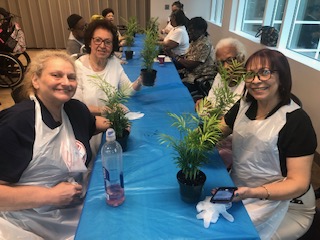Well Rooted Living and Horticultural Therapy
There’s an interesting bond shared by residents at The New Jewish Home. They just love getting their hands dirty.
Twice a month, groups gather on our Manhattan campus, Sarah Neuman in Westchester and at the adult day care program in the Bronx to dig into gardening programs that are designed to do much more than improve the look of the campus. Their greater purpose is to improve the health of the gardeners themselves.
The practice of horticultural therapy has evolved into a scientifically measurable health care discipline. It involves engagement in gardening-related activities, and it is facilitated by a trained therapist to achieve specific treatment goals.
Horticultural therapy is now employed to improve the social, psychological, and physical health of people of all ages while contributing greatly to their quality of life. Horticultural therapists guide participants in learning new skills or regaining those that are lost, including improving memory, cognitive abilities, task initiation, and language skills. In physical rehabilitation, horticultural therapy can help strengthen muscles and improve coordination, balance, and endurance. And, just as important, gardening by its nature can be a highly social activity.
“What’s great about horticultural therapy is that it can be administered in a variety of places and still be effective. In Manhattan and Sarah Neuman during the warm months, we take advantage of having access to outdoor specious gardens, and residents absolutely enjoy spending time outside. And at the Bronx adult day program, we meet in a multipurpose room and still have a great time,” explains Pat Czarnecki, a noted specialist in the field and leader of The New Jewish Home’s horticultural therapy program.
“We can deliver gardening-based therapies in a one-on-one setting at bedside with a basket of colorful flowers or fragrant/tactile herbs. Or we can gather in large groups to activate garden beds or planters with wheelchair access and ergonomic hand tools. There are literally hundreds of ways we can tailor activities to achieve specific therapies for residents, and once they learn those activities, they are not only easily repeatable they’re enjoyable as well,” says Czarnecki.
Over the summer, a workshop of about 20 residents at the Manhattan campus potted plants to take back to their rooms. Adult day health care clients in the Bronx participate in seasonal craft plantings to celebrate the beginning of autumn or holidays like Valentine’s Day and Easter. And groups as large as 50 people gather at Sarah Neuman for horticultural programs curated by experts from the New York Botanical Garden.
And because these programs are administered in a medically supervised setting, their benefits can be measured and documented to demonstrate improvement in a person’s well-being.
But all you need to see to verify the resounding success of The New Jewish Home’s horticultural therapy are the smiles of the participants — and the dirt under their fingernails.
The New Jewish Home has a proud legacy of empowering older adults to live with purpose and enhanced well-being. We’ve been around since 1848 as one of the nation’s first nursing homes, and now serving older New Yorkers of all backgrounds through a portfolio of health care services, including post-acute care and rehabilitation, skilled nursing, adult day care, assisted living, and at-home care.
See how we continue to elevate health care for older adults through our Research Institute on Aging and our SkillSpring program (formerly known as Geriatrics Career Development program), which empower teens and young adults to begin careers in health care.

